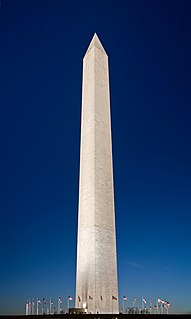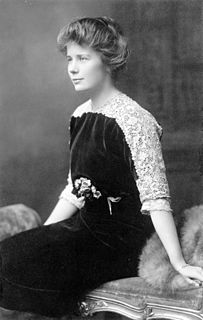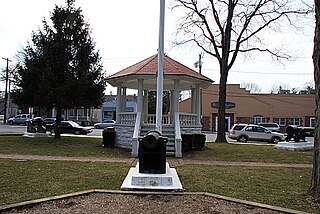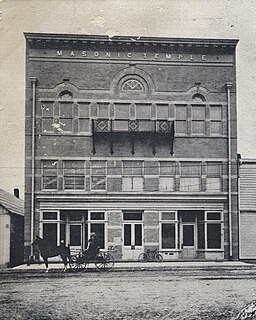
Oyster Bay is a hamlet and census-designated place (CDP) on the North Shore of Long Island in Nassau County in the state of New York, United States. The hamlet is also the site of a station on the Oyster Bay Branch of the Long Island Rail Road and the eastern termination point of that branch of the railroad.

Sagamore Hill was the home of the 26th president of the United States, Theodore Roosevelt, from 1885 until his death in 1919. It is located in Cove Neck, New York, near Oyster Bay on the North Shore of Long Island, 25 miles (40 km) east of Manhattan. It is now the Sagamore Hill National Historic Site, which includes the Theodore Roosevelt Museum in a later building on the grounds.

The George Washington Masonic National Memorial is a Masonic building and memorial located in Alexandria, Virginia, outside Washington, D.C. It is dedicated to the memory of George Washington, the first President of the United States and a Mason. The tower is fashioned after the ancient Lighthouse of Alexandria in Egypt. The 333-foot (101 m) tall memorial sits atop Shooter's Hill at 101 Callahan Drive. Construction began in 1922, the building was dedicated in 1932, and the interior finally completed in 1970. In July 2015, it was designated a National Historic Landmark for its architecture, and as one of the largest-scale private memorials to honor Washington.

The presidential memorials in the United States honor the various presidents of the United States and seek to perpetuate their legacies.

Ethel Carow Derby was the youngest daughter and fourth child of the President of the United States Theodore Roosevelt. Known as "The Queen" or "The First Lady of Oyster Bay" by its Long Island residents, Ethel was instrumental in preserving both the legacy of her father as well as the family home, "Sagamore Hill" for future generations, especially after the death of her mother, Edith, in 1948.
The Theodore Roosevelt Association (TRA) is a historical and cultural organization dedicated to honoring the life and work of Theodore Roosevelt (1858–1919), the 26th President of the United States.

Moore's Building is a historic building located in the downtown area of the Hamlet of Oyster Bay and listed on the National Register of Historic Places. First built in 1901, the building gained significance when Theodore Roosevelt had his staff take offices here while he served as U.S. President. The Moore's Building is listed on the National Register of Historic Places, a Town of Oyster Bay Landmark, and a featured site on the Oyster Bay History Walk audio walking tour.

The Oyster Bay Post Office in Oyster Bay, New York was completed in 1936. New York architect William Bottomley designed this colonial revival structure to mirror the Oyster Bay Town Hall across the street. Inside are murals by the prominent American artist, illustrator and author Ernest Peixotto, depicting scenes in Oyster Bay from 1653 to 1936 when the Post Office was built. This building is listed on the National Register of Historic Places and featured on the Oyster Bay History Walk.

Theodore Roosevelt Memorial Park is a park in the hamlet of Oyster Bay, New York, honoring President Theodore Roosevelt, 26th President of the United States.

The Theodore Roosevelt Monument Assemblage is a collection of 24 stones and plaque located in the Theodore Roosevelt Memorial Park in Oyster Bay, New York. The stones and other objects are meant to each represent a "chapter" and together form a "book" telling the story of Theodore Roosevelt, 26th President of the United States.

Christ Church, founded in 1705, is a historic Episcopal parish located at 61 East Main Street in Oyster Bay, New York. Several church buildings have occupied this site, including one that served as soldiers' barracks during the Revolutionary War.
Youngs Memorial Cemetery is a small cemetery in the village of Oyster Bay Cove, New York in the United States of America. It is located approximately one and a half miles south of Sagamore Hill National Historic Site. The cemetery was chartered in 1900 and was located on land owned by the Youngs family.

The Underhill Burying Ground is a cemetery located within the Village of Lattingtown, in the Town of Oyster Bay in Nassau County, New York. The cemetery has been in continuous operation since the burial of Captain John Underhill in 1672. The Underhill Burying Ground is governed by the Underhill Burying Ground, Inc., a non-profit organization, incorporated under the laws of the State of New York.
The Oyster Bay History Walk is a path through downtown Oyster Bay, New York that leads the walker to 30 historic sites. It is a 1-mile loop and is the first certified American Heart Association Start! Walking Path on Long Island.

Fleet's Hall is a building that once stood in Oyster Bay, New York, that had important local, statewide, and national significance. The building served as an important civic and social meeting place during the time that Theodore Roosevelt was a resident of Oyster Bay and served as Governor of New York State and later President of the United States. The building was used for events such as public meetings, concerts, receptions, dances, and dinners. It was also the site of the first moving picture screening in Oyster Bay.

The Oyster Bay Bank Building was constructed in 1891 and served as the first bank in Oyster Bay on Long Island, New York. In addition to the bank, other users have included the Masons of Matinecock Lodge, Theodore Roosevelt while he served as Governor of New York, and architect Edward Durrell Stone. Today this building is a featured site on the Oyster Bay History Walk audio walking tour.

Derby-Hall Bandstand is a replica of the bandstand which stood on this site in Oyster Bay, New York, United States, and was used by President Theodore Roosevelt and others to give public speeches. The original bandstand was taken down in the 1930s and replaced by a replica in 1981. The location is a featured site on the Oyster Bay History Walk audio walking tour.
Wightman Memorial Baptist Church in Oyster Bay, New York, was first built in 1908. It is the third building on this site. The first Baptist congregation met in Oyster Bay as early as 1700, and Oyster Bay received its first ordained minister in 1724. The second church building, constructed in 1806 is still visible on the site, behind the newer structure.
Several memorials have been devoted to Theodore Roosevelt, the 26th president of the United States. Additionally, various groups have acted to preserve his legacy.

Jephtha Masonic Lodge No. 494 is an historic Masonic lodge, part of the fraternal organization of Freemasonry, located in Huntington, New York, part of the Suffolk Masonic District in Eastern, Long Island. It was established in late 1859.














